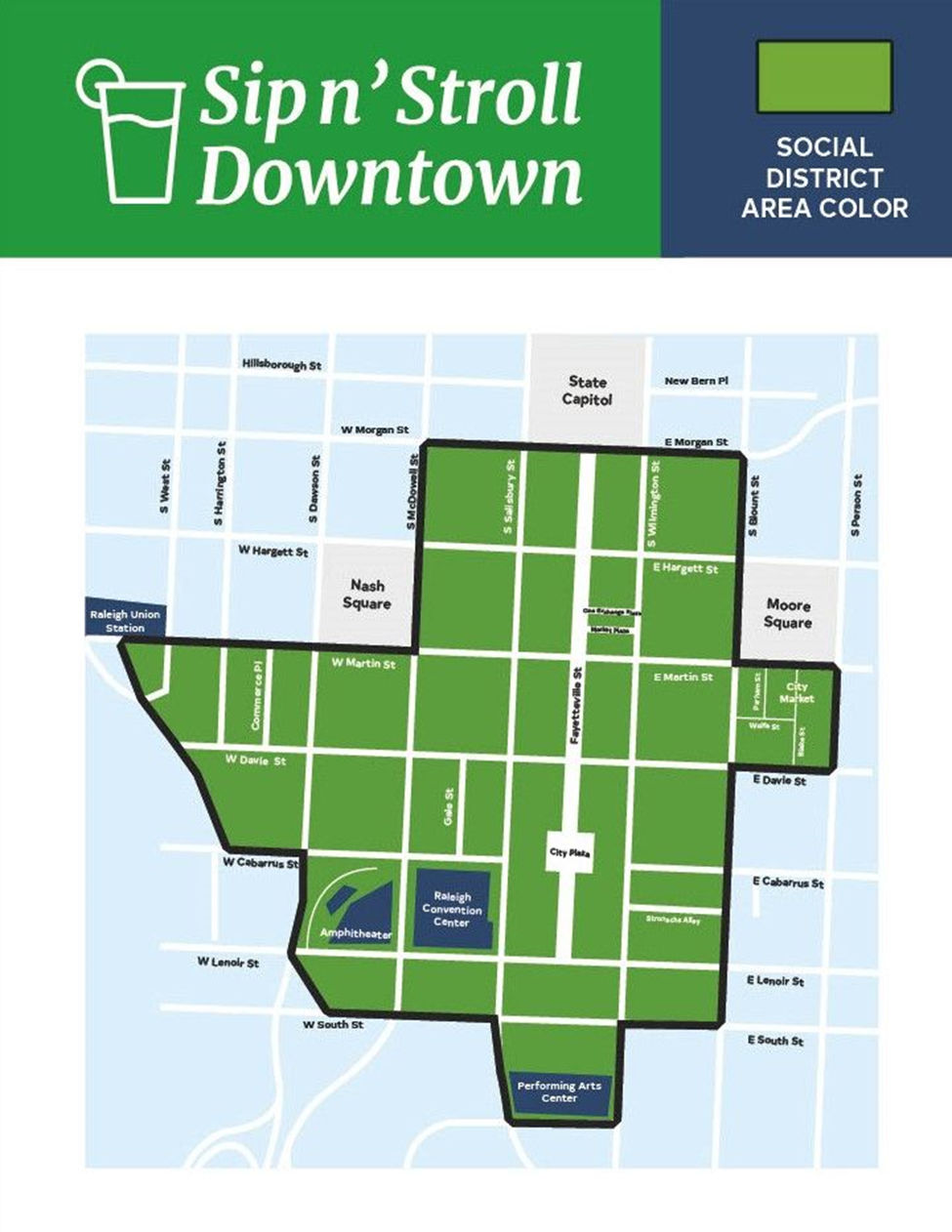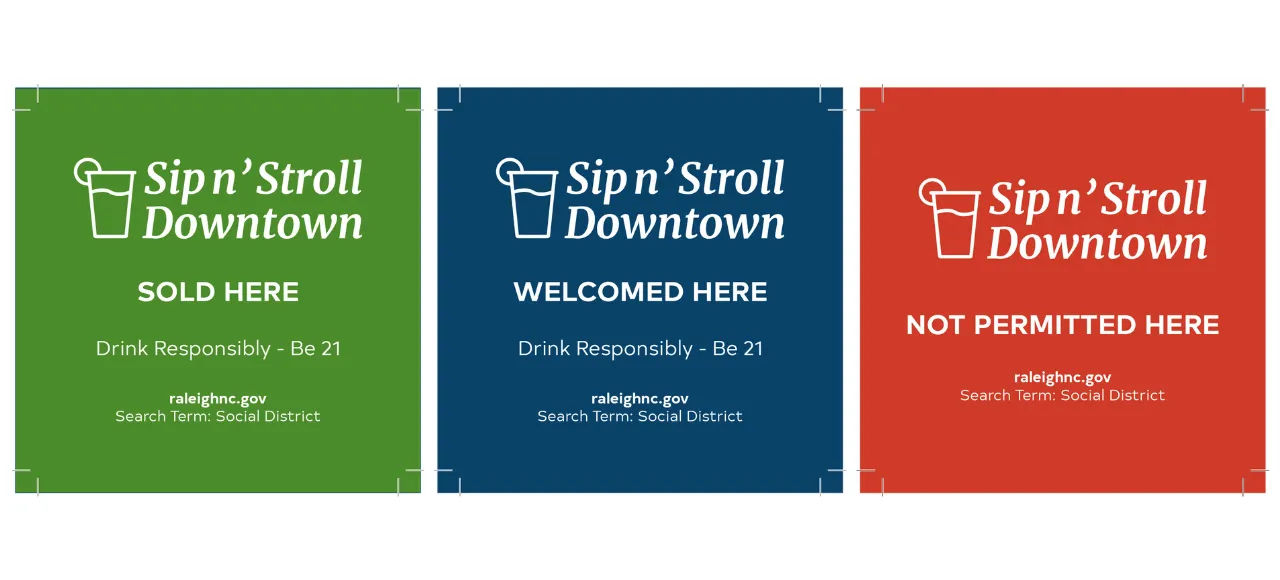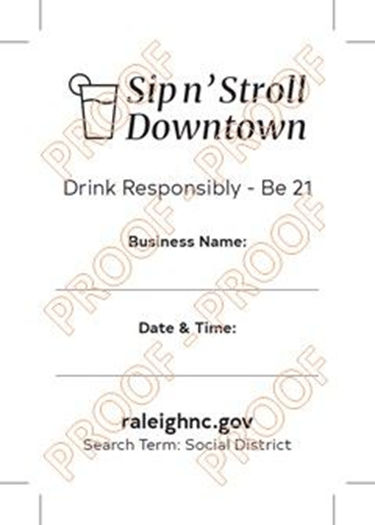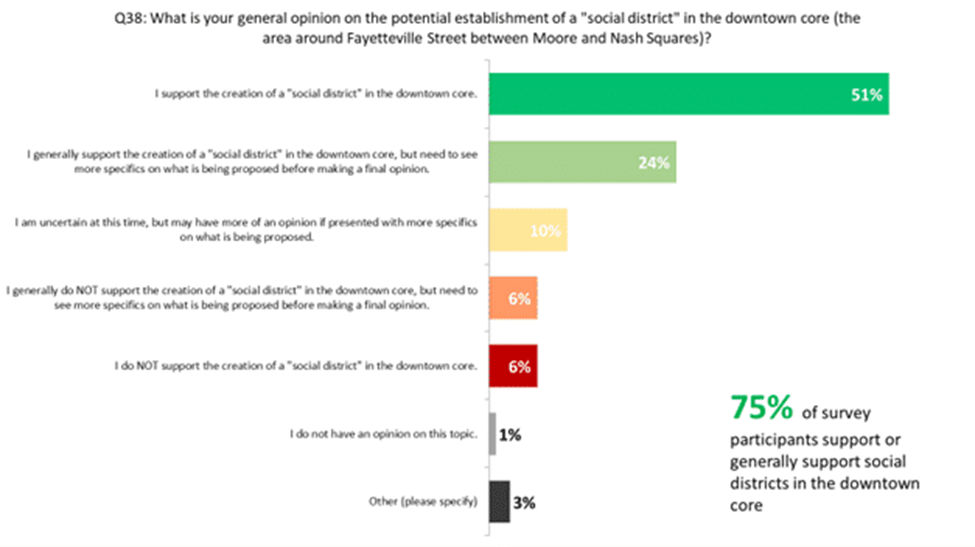For up-to-date information on the social district, including information about the social district's expansion in fall of 2023, please visit our dedicated webpage about Sip n' Stroll Downtown.
On July 5th, Raleigh City Council approved a “Social District” for a portion of Downtown Raleigh to begin operation August 15th. Below is an explainer and FAQ for social districts to help provide some overview of this program. As we learn more about the specifics of implementation, we will update this resource.
This measure was taken as one of many to enhance the Fayetteville Street district and core of Downtown Raleigh. Other measures include decreasing storefront vacancies via direct recruitment of new businesses by DRA’s storefront recruiter, more frequent activation of City Plaza and Moore Square to make downtown a more engaging place to work and live, working with the City of Raleigh on enhanced cleaning services in downtown, working with employers to encourage the return of office employees, increasing Downtown Raleigh Ambassadors staffing to ensure a safe environment, and working with property owners on aesthetic improvements and investments to their buildings. At DRA, our role in this initiative has been--and continues to be—focused on bringing people together to make the best decisions possible and ensure the Downtown Raleigh community has a voice in how this program is crafted and executed.
The Basics
My businesses is eligible for participation in the Social District. Where can I opt-in?
For businesses that are ready to opt in or out of the pilot district, please indicate your preference by completing the interest form here. Completion or resubmission of that interest form will indicate your preference. Submissions are timestamped. If you change your mind, the most recent form submission will be used. This form may also be used to explicitly opt out of the district. Businesses that have not indicated their participation will by default be opted out until indicated otherwise.
What is a Social District?
A defined area where a person may consume an alcoholic beverage sold by an ABC permittee, including sidewalks and public right of way in that defined district. Customers can purchase drinks in a specially-identified cup from an ABC permittee and walk with that beverage within this district.
Is this a permanent district or an experiment?
Raleigh City Council designated this as a pilot program with City staff to report back to Council in early 2023 on how this district is going. If the district is seen as beneficial, then this could be made more permanent, expanded, or otherwise adjusted based on feedback and performance. And if the district is creating adverse issues, it can also be adjusted accordingly. Ultimately, any future changes to the district will be the decision of Raleigh City Council with feedback from the downtown community.
What are the boundaries of this Social District?
Raleigh City Council set the following boundaries to focus the majority of the Social District on the Fayetteville Street district with portions of the Moore Square District and Warehouse District
included. Within the Social District, several public facilities are excluded such as parking decks and GoRaleigh Station. Moore Square and Nash Square are not included in the social district boundaries.
Glenwood South is NOT included within the pilot Downtown Social District.

What are the hours of the Social District?
11am-10:00pm, 7 days a week.
When will this district start being operational?
August 15th, 2022.
Will there be signage for the boundaries of the Social District?
Yes, City of Raleigh is working to create signage that will define the boundaries of the district.
Where else are these districts in place?
Prior to Raleigh’s adoption of this Social District, Greensboro was the largest city in North Carolina to have one of these districts. Kannapolis, Salisbury, Hickory, Monroe, and several other North Carolina cities also have established these districts. Durham and Charlotte currently are exploring potential adoption of social districts, as well. Other states have variations on social districts, including Michigan and Alabama.
More detailed information for businesses
Are businesses within the district required to participate?
No, both businesses that sell alcohol and those that do not may opt in or opt out of the districts. For example, a restaurant that has an ABC license to sell beverages can choose if it sells these drinks in the special cups that allow a patron to walk around the social district or not. Likewise, a retailer within the district can choose if they allow in patrons with social district cups or not. The City of Raleigh will provide window clings to business that opt in or out to clearly identify participation status.

Can non-ABC permittee businesses, such as retailers and personal services, allow patrons with drinks or conversely prevent patrons with drinks from entering their businesses?
Yes. All businesses within the boundaries of the Social District can choose if they allow or prevent patrons to enter with drinks in these Social District cups. (However, non-ABC permittee businesses, such as retailers and personal services, may not sell to-go beverages in the district.)
Can a convenience store that sells packaged alcoholic beverages, such as six-packs of beer or bottles of wine, participate by selling to-go beverages in the Social District?
No. Only establishments with ABC permits that allow them to serve drinks on their premises are allowed to participate in selling beverages.
How do I formally opt in my business to participate in this district?
For businesses that are ready at this time to opt in or out of the pilot district, please indicate your preference by completing the interest form here. Completion or resubmission of that interest form will indicate your preference. Submissions are timestamped. If you change your mind, the most recent form submission will be used. This form may also be used to explicitly opt out of the district. Businesses that have not indicated their participation will by default be opted out until indicated otherwise.
Cups and Sustainability
Details are pending finalization, but even more updated information is now available about to-go cup requirements:
- The to-go cup system
is a two-part solution- a combination of (1) a to-go cup provided by serving businesses and (2) a sticker provided by the City of Raleigh that must be applied to the to-go cup by the serving business. - Participating businesses
are responsible for sourcing to-go cups. - The cups themselves may vary in color, size, and material so long as they do not exceed 16 oz and are not glass.
- The
Citydesigned a cup sticker that businesses must apply to each to-go cup. - To-go drinks may not be vended without the designated sticker applied.
- The stickers
will provide a line for businesses to write in their business name and the date of the beverage being served in permanent marker. - The initial batch of stickers is two (2) inches wide by three (3) inches tall. Spacing has been updated to accommodate more room, and future orders of stickers are 2.5 inches wide by 3.5 inches tall.
- The sticker contains required branding and language to satisfy the state requirements.
- Initially the city will be providing the stickers for free to participating businesses until a 3rd party vendor is identified for businesses to order from directly.

Community engagement on Social Districts strongly favored use of sustainable cups and we encourage businesses to follow that direction. The preferred material for recyclability of cups is cups made of PET/PETE (Polyethylene Terephthalate). The provided stickers will NOT affect the ability of cups to be recycled.
Longer term, City and DRA staff also are working on a potential printed cup also made of recyclable or compostable materials for businesses to purchase for use and finding a solution for businesses to directly purchase stickers in the future.
Will there be additional trash or recycling cans in the district?
Based on direct community feedback, DRA has advocated for the deployment of additional solid waste resources and receptacles timed with the implementation of the Social District. Members of Raleigh City Council’s Economic Development and Innovation Committee and Raleigh City Council have also provided feedback to City staff to explore deploying additional receptacles or resources in their direction to City staff on the implementation of this district. City staff are currently evaluating potential actions and solutions related to this with more information to come soon.
Special Events & Social Districts
How do these Social Districts interact with special events?
Within the City of Raleigh, a special event permit that includes the temporary permit of alcohol sales by the special event can alter how the social district would function. Event organizers have the option to allow social district beverages from outside their permitted event footprint to enter their event space and this is handled on a case by case basis. More information on special events and the social district can be referenced here.
Community Feedback & Questions
What prevents this Social District from becoming a major nightlife concern for noise and misbehavior?
The primary mechanism for reducing the potential for this are the hours of operation which end at 10:00pm specifically to avoid creating a noisy late night atmosphere. If a business fails to adhere to the rules and continues sales past 10pm, as with any other ABC rules, that business would risk punishment from the NC ABC Commission, which could include loss of license.
The other mechanism is that this is a pilot program with an opportunity for review in early 2023. If community feedback, along with metrics showing increases in problems, indicate more problems stemming from this district, then it can be adjusted or altered further to address those concerns.
Our goal is for Downtown Raleigh to benefit from any effort such as this. If our community does not see benefit, we will advocate for changes to the Social District to ensure downtown is not negatively impacted by this program.
What was community feedback on Social Districts like prior to adoption of this pilot program?
Downtown Raleigh Alliance created three surveys and held four community engagement sessions to collect community feedback, as well as forming a taskforce of downtown businesses, residents, property owners and tenants to help provide in-depth feedback. As seen in the graph, downtown community members were generally open to the idea of trying a Social District. These feedback sessions, held in partnership with the City of Raleigh, provided input on interest in the pilot program, hours of operation, boundaries and areas of concern. The major concerns raised were desires to see no increases in noise, trash, misbehavior, liability for businesses, as well as desire to see a sustainable option for the cups themselves. Community members also were sensitive to potential burdens of enforcement on Raleigh Police and businesses. DRA provided all of this feedback to Raleigh City Council’s Economic Development and Innovation Committee on May 24th and provided some additional feedback to the same committee on June 28th.

What has been and will be Downtown Raleigh Alliance’s role in the Social District?
In late winter 2022, Raleigh City Council asked DRA to engage the downtown community on gauging interest in having a Social District and then exploring questions on potential concerns, boundaries, hours of operation and any other issues that were raised. As outlined above, DRA held four community sessions and conducted three surveys. DRA also spoke with downtown organizations in cities with existing social districts in North Carolina and in other states to understand their experiences and lessons learned. The results of this process were presented to Council’s Economic Development and Innovation Committee on May 24th with feedback outlined above. DRA provided additional feedback at the June 28th meeting on the need for additional trash/recycling receptacles in the Social District, particularly at boundaries so exiting patrons had places to appropriately place their cups as they leave the Social District.
The City of Raleigh has connected with downtown businesses to conduct educational sessions on the rules and operations of the Social District, including the correct window signage and stickers for participating locations. DRA is also assisting downtown businesses with understanding what is needed for cups that follow state law guiding social districts. DRA will continue collecting feedback from downtown residents, businesses, and community members on how the Social District is affecting them, positively or negatively, to provide to City staff and Council as they re-examine the district in early 2023. Enforcement of the Social District’s rules and regulations will be the responsibility of local law enforcement and ALE, while adhering to and following rules will be the responsibility of participating businesses.
How can I provide feedback on the Social District?
You may submit feedback anytime, here, through this online feedback form. Feedback collected through the form will be shared with City staff and Council as they implement the district and again as they examine adjustments to the pilot program in early 2023.